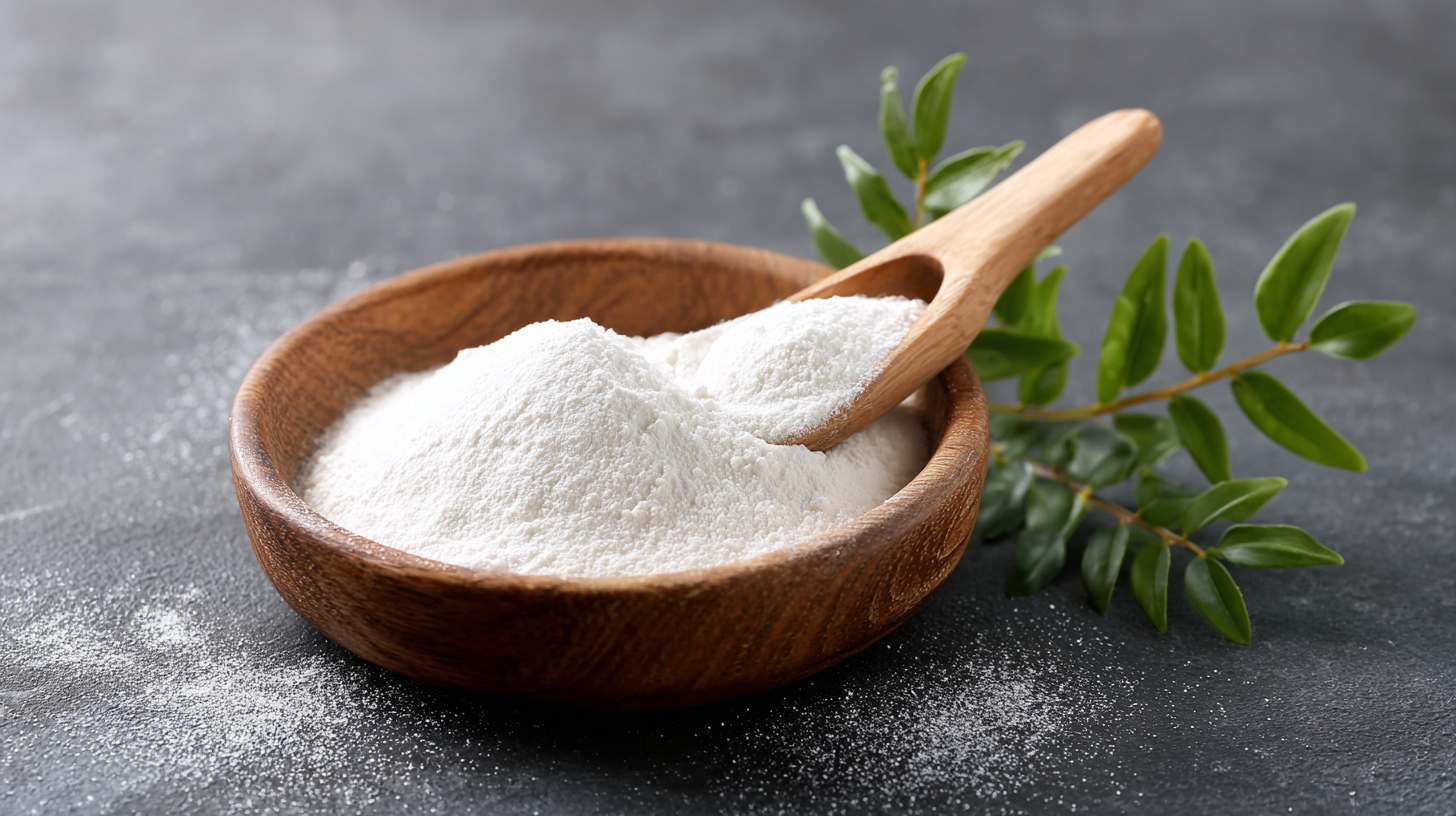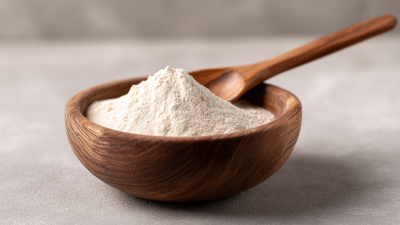In recent years, the skincare industry has witnessed a surge in the popularity of brightening agents, with Alpha Arbutin Powder for skin emerging as a leading ingredient. According to a report by Grand View Research, the global skin brightening products market is expected to reach USD 8.9 billion by 2025, driven by increasing consumer awareness about skin health and the demand for effective formulations. Alpha Arbutin, a naturally occurring derivative of hydroquinone, is renowned for its ability to inhibit melanin production, making it a favored choice among consumers seeking a more even skin tone. A study published in the Journal of Cosmetic Dermatology highlights that products containing Alpha Arbutin can deliver visible results in as little as four weeks, making it a vital addition to daily skincare routines. As consumers become more educated about the benefits of ingredients like Alpha Arbutin, the demand for specialized skincare products continues to grow, further solidifying its status in the skincare arena.

Alpha arbutin is a powerful ingredient known for its skin brightening properties, derived from the bearberry plant. Unlike its predecessor, hydroquinone, alpha arbutin is a safer alternative that reduces the risk of irritation. It works by inhibiting tyrosinase, an enzyme responsible for the production of melanin in the skin. This mechanism ensures a more even skin tone, reduces dark spots, and enhances overall radiance, making it a sought-after addition to many skincare routines.
When incorporating alpha arbutin powder into your daily skincare regimen, consider mixing it with a hydrating serum or cream to enhance its absorption. Begin with a patch test to ensure your skin tolerates the ingredient well. For maximum benefits, apply it twice daily, and always follow up with sunscreen in the morning to protect your skin and prevent further pigmentation.
Tips: To boost the efficacy of alpha arbutin, pair it with vitamin C, as both ingredients work synergistically to combat hyperpigmentation. Additionally, maintain a consistent skincare routine, as results may take time to manifest. Keep your skin hydrated, as a well-moisturized complexion enhances the visibility of brightened skin.
Alpha arbutin has emerged as a powerful ingredient in skincare, particularly for its role in inhibiting melanin production. Melanin is the pigment responsible for skin color, and its overproduction can lead to dark spots and uneven skin tone. Research has shown that alpha arbutin effectively reduces melanin synthesis by inhibiting the enzyme tyrosinase, which plays a crucial part in melanin formation. According to a study published in the *Journal of Cosmetic Dermatology*, alpha arbutin can decrease melanin levels by up to 50% within a few weeks of consistent use, making it a highly effective agent for skin brightening.
Incorporating alpha arbutin powder into your daily skincare routine can provide significant benefits. It is best used in concentrations of 1-2%, which can be easily mixed with serums or creams. When formulating your skincare products, ensure that you apply alpha arbutin in conjunction with other brightening agents, such as vitamin C or niacinamide, for enhanced effects.
**Tips:**
1. Always conduct a patch test before incorporating alpha arbutin into your routine to avoid potential reactions.
2. Use sunscreen daily to protect your skin from UV rays, which can exacerbate hyperpigmentation.
By understanding the science behind alpha arbutin and its melanin inhibitory properties, you can make informed choices to achieve a radiant and even complexion.
Recent clinical studies have highlighted the effectiveness of alpha arbutin as a skin brightening agent, positioning it as a potent alternative to other well-known brighteners. Unlike traditional ingredients such as hydroquinone—which may pose risks of irritation and other side effects—alpha arbutin is derived from natural sources and is recognized for its gentleness on the skin. Research indicates that alpha arbutin works by inhibiting tyrosinase, an enzyme responsible for melanin production, thereby reducing hyperpigmentation and promoting a more even skin tone.
In comparative analyses, alpha arbutin has shown promising results against other skin brightening compounds like kojic acid and vitamin C. While these alternatives may offer some lightening benefits, alpha arbutin stands out for its stability and lower potential for irritation, making it suitable for a wider range of skin types. The cumulative effect of using alpha arbutin consistently in skincare routines suggests not only short-term improvements in skin luminosity but also long-term efficacy in combating dark spots and uneven skin texture.
| Skin Brightening Ingredient | Effectiveness (Measurable Results) | Clinical Studies (Count) | Usage Duration for Best Results | Irritation Potential |
|---|---|---|---|---|
| Alpha Arbutin | Significant reduction in hyperpigmentation (up to 50% over 12 weeks) | 8 | 4-12 weeks | Low |
| Kojic Acid | Moderate reduction in spots (30% over 8 weeks) | 5 | 8 weeks | Medium |
| Vitamin C | Visible brightening effects (up to 40% over 10 weeks) | 10 | 6-12 weeks | Medium to High |
| Niacinamide | Improvement in skin tone (20% over 12 weeks) | 6 | 8-12 weeks | Low |
Alpha arbutin is gaining recognition in the skincare industry for its skin-brightening capabilities, but understanding its safety and tolerance based on dermatological research is crucial before incorporating it into your daily routine. Studies have shown that alpha arbutin is generally well-tolerated by various skin types, including sensitive skin. Its gentle nature allows it to effectively inhibit melanin production without leading to harsh side effects commonly associated with other skin-brightening agents, such as hydroquinone. This makes alpha arbutin a viable option for individuals looking to reduce dark spots and achieve a more radiant complexion.
When considering alpha arbutin, it’s essential to pay attention to a few tips to maximize its benefits. Start with a patch test to ensure your skin reacts positively, especially if you have sensitive skin. Using a concentration of 1-2% in your skincare products is typically effective and safe for daily use. Incorporating alpha arbutin in a serum or moisturizer allows for better absorption while keeping your skin hydrated. Finally, don't forget to apply sunscreen during the day, as brightening agents can increase skin sensitivity to UV rays, ensuring you maintain that youthful glow.

Incorporating Alpha Arbutin into your skincare routine can be a game-changer, especially for those struggling with hyperpigmentation and uneven skin tone. This powerful ingredient is praised by dermatologists for its ability to fade dark spots effectively while remaining gentle on the skin. Unlike some harsher treatments, alpha arbutin works without irritation, making it suitable for various skin types.

To seamlessly integrate alpha arbutin into your regimen, consider mixing it with your favorite serums or applying it directly to targeted areas of concern. For maximum efficacy, dermatologists recommend using it twice daily, especially in conjunction with a sunscreen during the day to protect your skin from further discoloration. This combination can enhance the brightening effects while preventing new dark spots from forming.
Tips: Always patch test when introducing new ingredients to your routine. Additionally, layering alpha arbutin with antioxidants like vitamin C can provide added protection and boost skin brightness. Remember, consistency is key—make alpha arbutin a staple in your skincare lineup for noticeable results over time.






